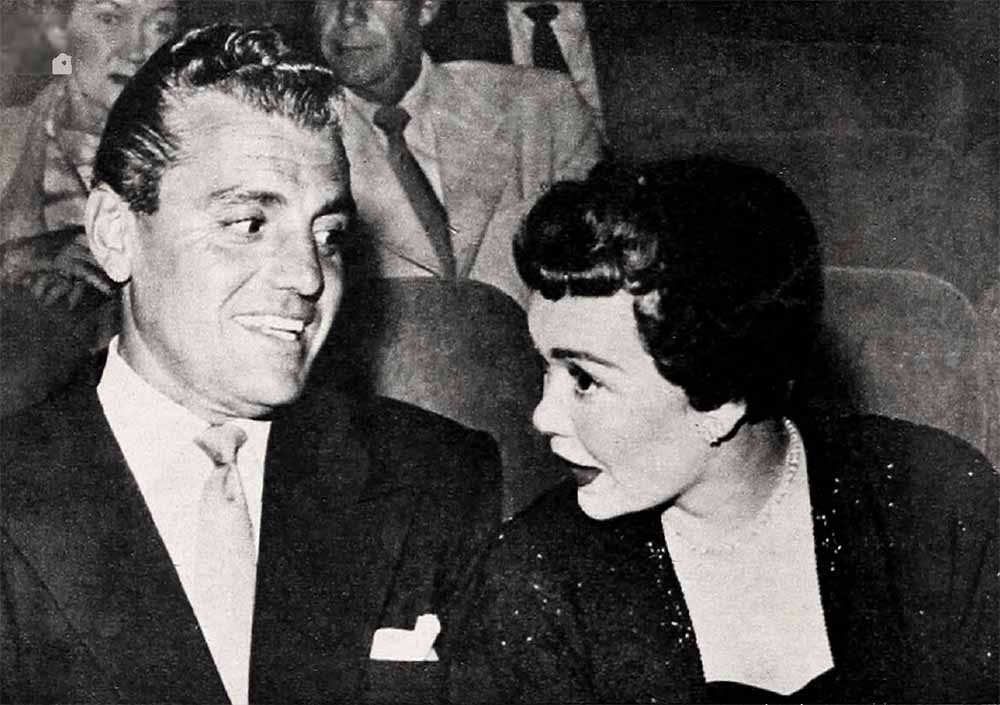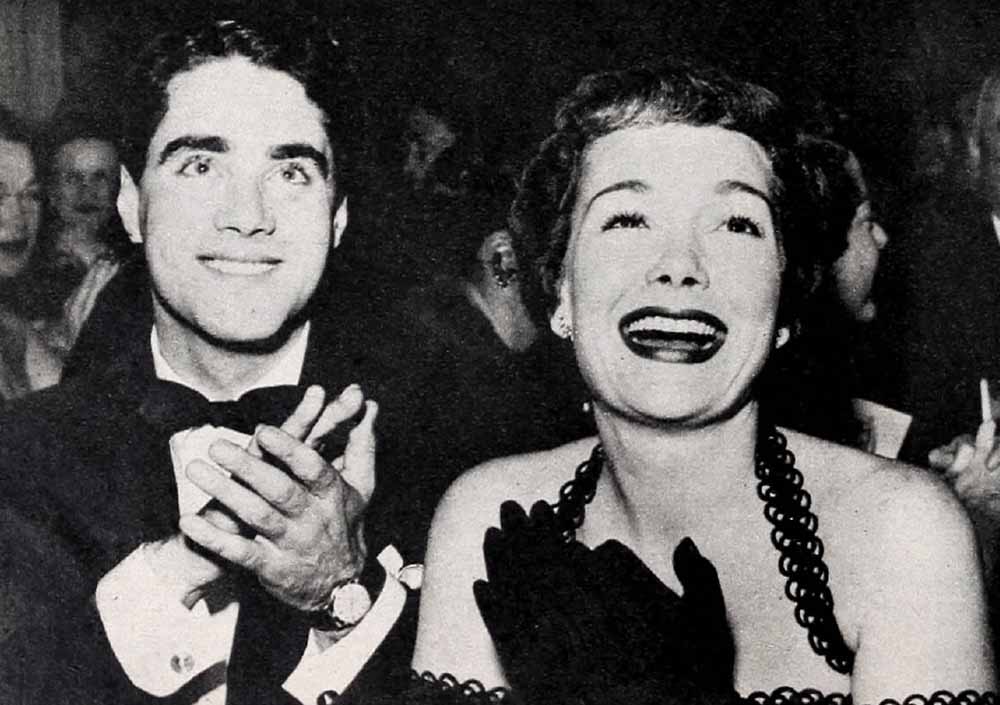Touch Song . . .
It was to have been a June wedding for Jane Wyman and Travis Kleefeld.
“A real wedding,” Jane said, “and I’m going to have a real trousseau—I never was able to afford one before.”
They were making elaborate plans, too, for a glamorous European honeymoon.
And then—just three weeks after they very formally and officially announced their engagement—with designer Edith Head already busy planning Jane’s travel wardrobe and ticket agencies scouting for steamship reservations for two, Jane and Travis released a second cryptic announcement to the press. The engagement was off. They would remain “good friends.”
AUDIO BOOK
Of the two news items, only the first took Hollywood insiders by surprise.
Photographers on the night beat began snapping Jane with the young and darkly handsome Mr. Kleefeld on occasional dates at Ciro’s or Mocambo early this year. Travis also was her escort when she turned up to accept the Foreign Correspondents’ Golden Globe Award for her “best performance of the year” in “The Blue Veil.”
But always Jane pooh-poohed every suggestion that this new twosome was a romance.
“Not even a steady date,” she scoffed merrily, and the boys and girls whose business it is to get all the romantic news and get it straight believed her.

And they are not easily fooled.
They believed Jane when she said she was not seriously interested in Travis Kleefeld because they were dead certain, despite the cagey lady’s fervent denials, that she was carrying a great, big, blazing torch for her on-again-off-again beau of the past two years, attorney Gregson Bautzer.
The dopesters, with the engagement story staring at them in the morning papers, were stunned, talking to themselves with question marks.
“Wot hoppened?” was the first question, but the newshounds couldn’t tarry over their answers. “Who is Travis Kleefeld?” was more urgent, and the race was on to dig up the facts about the almost unknown young man who—with the photographers looking the other way—had slipped an enormous diamond on Jane’s third finger, left hand.
That Travis Kleefeld was just twenty-six, twelve years younger than Jane, was soon established. And one of the more acid columnists took her revenge for having been caught napping by sniping, “Travis Kleefeld was playing a saxophone in the Hollywood High School band when Jane Wyman was starring in musicals at Warners’.”

That Travis was rich was fact number two to be aired. One actor friend of Jane’s who works very hard for a modest living replied when asked what’ Travis did, “He spends money.”
This was not quite fair. A couple of years ago Travis had enjoyed a carefree whirl in Hollywood social circles, distinguished chiefly by his well-padded pockets and the desire, not uncommon in these circles, to carve out a career as an actor. That desire, also not uncommonly, was never fulfilled. In Travis case there was no lack of ambition or talent, but the young man fell heir, upon his father’s death a year ago, not only to the Kleefeid fortune but to the heavy responsibility of running the family business. As head of Kleefeid and Son, a vast building enterprise, Travis is not only rich, but hard working.
Jane and Travis met last autumn at a dinner party. Jane was in one of her gay, bouncy moods—probably carried over from the Paramount set where she was winding up “Just for You,” with Bing Crosby. Travis Kleefeld was completely captivated. He began bombarding her with invitations, with flowers, presents. Jane—apparently—couldn’t have been less interested.
He telephoned her daily, with dogged tenacity, to ask her to go out with him. She was working, and that meant early to bed, or she had a previous engagement.
All this, of course, was before Jane broke off finally and—as the gossips insisted—heartbrokenly with Greg Bautzer.
Jane insisted to all questioners that she was not still in love with Greg, never had been in love with him as a matter of fact. But nobody believed it. It was not just another case of “the lady doth protest too much.” When a girl is as important a star as Jane Wyman, the “private” in her private life is in quotes. And there were enough documented stories going the rounds—first of their marriage plans, then of Jane’s dark, dark blues when they called the whole thing off—to convince the most wide-eyed that Greg and Jane had been a lot more to each other than casual friends.
They tried desperately to keep it a secret—by going to the Reagan childrens’ pediatrician instead of to their own doctors—but they actually had come so close to marriage that they had taken the Wasserman tests required by California law before issuance of a marriage license.

Exactly why they called it quits at this point, in the very shadow of the altar, is their secret. But that Jane’s heart was, if not broken, badly cracked when Greg took up again with his old flame, Ginger Rogers, was gossip fodder for weeks afterward at every important dinner party in town.
Jane, making like a gay girl, whirled around the night spots on the arm of one eligible bachelor after another, “proving” that all the stories about the “poor, lonely little movie star” were so much eyewash.
But her close friends knew better, and knowing that she was miserably unhappy, tried valiantly to cheer her up. One “surprise ’ party arranged for this purpose brought together an assortment of cheerer- uppers including Rocky Cooper, Barbara Stanwyck and Nancy Sinatra. And it is to be imagined that a good cry was enjoyed by all.
“Greg and I were just friends,” Jane droned over and over again like a stuck phonograph record, but her friends knew better. And Greg Bautzer’s friends knew better—people who know that amazing man refuse on good evidence to believe that any girl he pursues can remain unmoved for long.
There have been too many of them—Lana Turner, Dorothy Lamour, Ginger Rogers, Joan Crawford, to name a few.
Lana has admitted in print that she was mad for the man, confessed candidly that she married Artie Shaw in a moment of pique after Greg, to whom she considered herself engaged, stood her up on a date.
“One of the most charming men I’ve ever known,” she said, adding good-naturedly (her broken heart mended long ago), “and the greatest escape artist in town.”
The guy has something, there’s no doubt about that.
Ask a man what it is and he’ll tell you—“Greg’s a man’s man, virile, successful, a gentleman and a sportsman whether it’s in the courtroom where he works, or on the tennis court or at the poker table, where he plays. And he’s out to win . . . wherever he is.
“Yet somehow, once he has won, he seems to lose interest—as though the fun were all in the battle, the victory anti-climactic.”
Ask a woman what it is about Bautzer and she’ll tell you—
“He’s a woman’s man . . . thoughtful, considerate, attentive. If you ask him to the most informal dinner party, he’ll send flowers the next day with a sweet note. If you go night-clubbing with him and are separated for so much as one dance, he’ll send a waiter with a scribbled message; ‘Miss you.’
“When you’re with him you know that for him at that moment, at least, you’re the only woman in the world, and the most beautiful.”
Yes, the handsome and elusive Mr. Bautzer has something and a girl who has had her turn as the only girl feels it when he steps out of her life.
Jane felt it, all denials notwithstanding, and her friends felt for her in the early weeks after their break-up when her most valiant pooh-poohing rang false.
A hundred people hurt for Jane, for instance, on last New Year’s Eve when she turned up at the Lou Wassermans’ gala party escorted only by her eleven-year- old daughter, Maureen. Jane found Greg already there dancing rapturously with Ginger Rogers, and Jane’s tears, as one witness put it, ‘glistened through the pancake.”
It was very soon after that New Year’s Eve party when Jane answered yet one more of the persistent Mr. Kleefeld’s telephone calls, and startled him probably with, Let’s do go out together tonight—anywhere you say.”
Everywhere Jane went after that, it seemed, Travis, like Mary’s little lamb, “was sure to go.”
But he wasn’t “even a steady date.”
Jane said so herself.
And in the next breath she announced their engagement.
“Rebound!” the whole town whispered.
“The real thing,” Jane countered fiercely, “we’re in love.”
But then, so quickly, sadly, too—for Jane is a dream girl whose dream romance has been long overdue—the engagement was off.
Another spring, another June, Jane Wyman may yet sing a love song.
But not yet.
The strains of the torch song still throb in her heart.
THE END
It is a quote. PHOTOPLAY MAGAZINE JULY 1952
AUDIO BOOK




